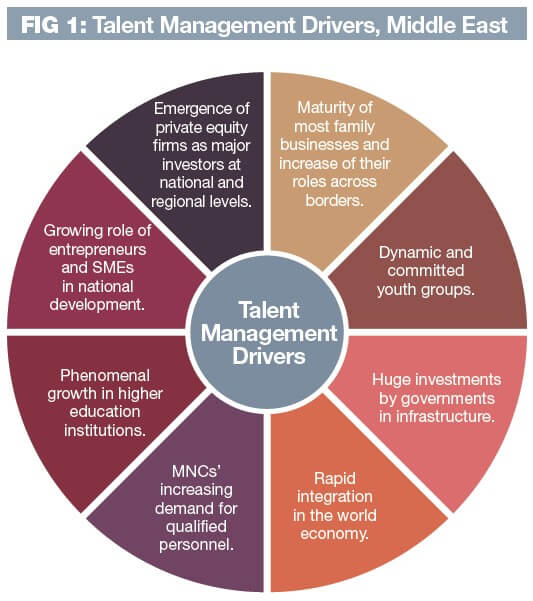Q&A with Prof. Abbas Ali
Talent Management is the process of discovering, deploying, motivating, and energizing the workforce within an organisation to effectively achieve objectives and enhance the competitive position in the marketplace. Best practice for talent management can, therefore, vary and emphasise different aspects according to the organisation’s national and cultural context. Prof. Abbas J. Ali, Ph.D., Professor of Management and Director, School of International Management, Eberly College of Business, at Indiana University of Pennsylvania, speaks about talent management in the Middle East its challenges, drivers, and trends.
What is your opinion on the current state of Corporate Human Capital strategies in the Middle East?
In some countries, where competition is relatively fierce, there has been an increasing emphasis on acquiring, retaining, and rewarding talent. However, human capital issues have been neglected. In fact, the focus is still on functional training, rigidity of job descriptions, and ignoring the need to align recruiting and training to strategic objectives of the business. In some organisations the idea that investment in people is not an asset strongly persists. Furthermore, career advancement should be link?d to potential contribution instead of focusing on seniority and conformity. Talent management is not yet considered an integral aspect of business strategy.
How would you define the term “talent management” and what are the global trends in that discipline?
Talent management is the process of discovering, developing, deploying, motivating, and energizing the workforce within an organisation to effectively achieve objectives and enhance the competitive position in the marketplace.
Major global talent trends are:
• Increasing competition among industrial nations for talent.
• Acute shortages of talent in the developed world and the emergence of developing nations as vital suppliers of talent.
• A shift from an emphasis on narrow skills to broad skills in recruiting.
• Increasing challenge of managing a diversified workforce.
• Increasing emphasis on HR as the most important factor in creating value in the marketplace.
• Increasing the strategic importance of succession planning for senior executives.
Companies have begun to devise plans linking compensation to competencies, performance to rewards, and recognising and nurturing internal talent while surveying the globe to attract talent. Furthermore, information systems and advanced technologies have made it easier for corporations to organise and standardise business activities, personnel, and performance.
What can talent management bring to the Middle East?
Talent management is strategically critical for achieving growth, improving productivity, setting the stage for innovation and creating a creative culture. It is also important for competing effectively in a highly global marketplace. While these are significant at the organisational level, effective utilisation of talent is important for alleviating poverty, and generating wealth and creating jobs in society. The latter takes on an added value as economic development programs have generally failed to produce tangible improvement in the wellbeing of the people in the region.
What are the drivers of talent management in the Middle East?
There are various drivers of talent management, which make it essential to face the mounting complexity of the challenges that countries in the region confront. Major drivers include (Figure 1):
• Huge investments by governments in infrastructure.
• Rapid integration in the world economy.
• MNCs’ increasing demand for qualified personnel.
• Phenomenal growth in higher education institutions.
• Growing role of entrepreneurs and small and medium firms in national development.
• The emergence of private equity firms as major investors at national and regional levels.
• Maturity of most family businesses and increase of their roles across borders.
• Dynamic and committed youth groups which are inspired to be a force in shaping economic development and opportunities.
What are the challenges for talent management in the Middle East?
The region enjoys five promising and relevant developments: economic expansion and growth, economic reform, increasing political openness, highest levels of labour force growth, and a young labour force. Nevertheless, talent management faces macro and micro impediments. At the macro level, challenges centre on weak legal institutions and institutional arrangements, weak private sectors, weak structural foundations of the economy as many Arab countries are turning into increasingly import oriented and service based economies, low quality of education, and the low participation of females in the workforce. At the micro level there is a noticeable presence of females at operational level but not at the senior level. Most business leaders appear not to value the pivotal role that employees play in productivity and growth. There is a lack of articulation of human resource policies, and an absence of a systematic approach to recruiting talent. It is crucial to recognise people with potential, and to nurture and cultivate human capital.

What are your recommendations for Arab businesses that want to set up talent management policies?
The region is uniquely situated to be a major economic force in the global economy. This is not because of the abundant energy reserves but also because the region is endowed with an enthusiastic workforce and it exhibits a capacity to preserve what is cherished and vital while adapting to modern technological and economic trends. For these very reasons, Arab businesses should espouse talent management policies that accelerate growth and creativity. What has to be done can be summarised in the following points:
• Businesses should revitalise the work environment unlocking trapped and under utilised talent of employees, be they nationals or expatriates, through enhanced recognition, motivation, and deployment of existing resources.
• Institutionalising assessment in recruiting and in linking rewards to performance.
• Investing in discovery and innovation especially in sectors essential for strengthening the wellbeing of future generations.
• Articulating human resource policies that prevent discrimination and enhancing retention of talent.
• Diversifying the workforce and giving a voice to women in decision-making.
• Enabling employees to release their creative energy and appreciate their imaginative capacities.
• Engaging with government agencies to enact labour policies that enable expatriates who contribute to human capital formation and quality of life to be rewarded and offered citizenship option.
• Broadening cooperation with civic organisations, educational institutions, and global corporations.
• Strengthening partnership with governments across the region to reduce poverty and enhance social responsibility.
Tharawat Magazine, Issue 6, 2010










